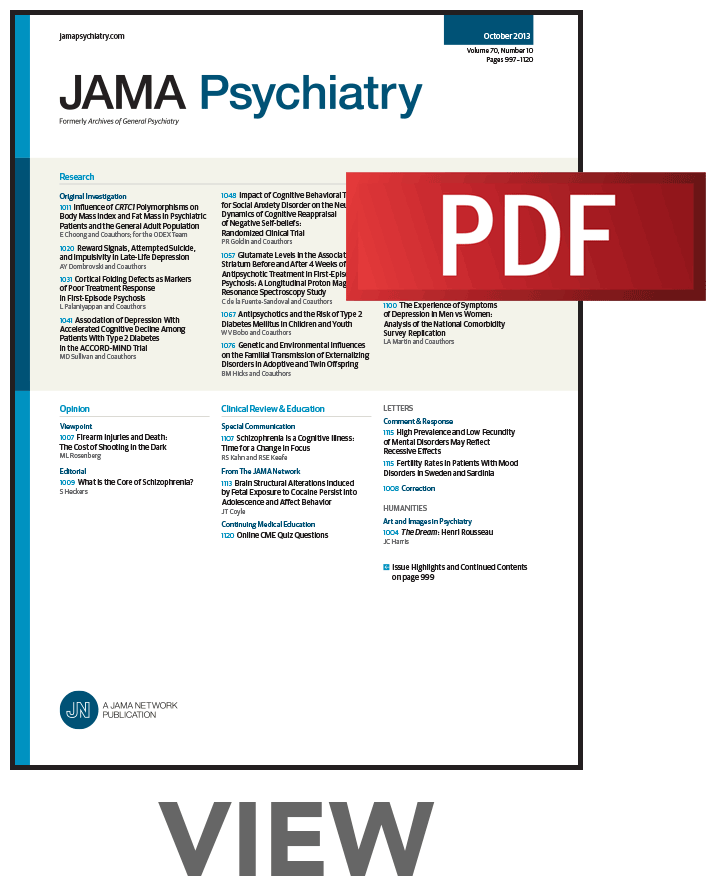将塞马鲁肽和利拉鲁肽重新用于酒精使用障碍的治疗
IF 22.5
1区 医学
Q1 PSYCHIATRY
引用次数: 0
摘要
重要性初步研究表明,用于治疗 2 型糖尿病和肥胖症的胰高血糖素样肽-1 受体 (GLP-1) 激动剂可能会降低饮酒量。目的测试与未使用 GLP-1 激动剂期间相比,同一患者在使用 GLP-1 激动剂期间因饮酒紊乱 (AUD) 而住院的风险是否会降低。研究人员从住院病人、专科门诊病人、因病缺勤病人和残疾抚恤金登记册中确定了人群队列。主要暴露是使用单个 GLP-1 激动剂(与不使用 GLP-1 激动剂进行比较),次要暴露是具有 AUD 适应症的药物。结果队列中包括 227 866 名 AUD 患者,其中男性 144 714 人(63.5%),女性 83 154 人(36.5%),平均(标清)年龄为 40.0(15.7)岁。随访时间中位数(IQR)为 8.8(4.0-13.3)年。共有 133 210 人(58.5%)经历过 AUD 住院治疗。塞马鲁肽(4321 名使用者)与最低风险相关(AUD:调整后危险比 [aHR],0.64;95% CI,0.50-0.83;任何 SUD:aHR,0.68;95% CI,0.54-0.85),而使用利拉鲁肽(4321 名使用者)与最低风险相关。85)和使用利拉鲁肽(2509 名使用者)的 AUD 和 SUD 住院风险第二低(AUD:aHR,0.72;95% CI,0.57-0.92;任何 SUD:aHR,0.78;95% CI,0.64-0.97)。使用任何 AUD 药物都会导致风险略有降低(aHR,0.98;95% CI,0.96-1.00)。使用塞马鲁肽(aHR,0.78;95% CI,0.68-0.90)和利拉鲁肽(aHR,0.79;95% CI,0.69-0.91)也与躯体住院风险降低有关,但与自杀未遂无关(塞马鲁肽:aHR,0.55;95% CI,0.23-1.结论和相关性在患有 AUD 和合并肥胖/2 型糖尿病的患者中,使用塞马鲁肽和利拉鲁肽与 AUD 导致的住院风险大幅降低有关。这一风险低于官方批准的抗焦虑和抑郁药物。塞马鲁肽和利拉鲁肽可能对治疗AUD有效,目前急需进行临床试验来证实这些发现。本文章由计算机程序翻译,如有差异,请以英文原文为准。
Repurposing Semaglutide and Liraglutide for Alcohol Use Disorder
ImportancePreliminary studies suggest that glucagon-like peptide-1 receptor (GLP-1) agonists, used to treat type 2 diabetes and obesity, may decrease alcohol consumption.ObjectiveTo test whether the risk of hospitalization due to alcohol use disorder (AUD) is decreased during the use of GLP-1 agonists compared with periods of nonuse for the same individual.Design, Setting, and ParticipantsThis cohort study was an observational study conducted nationwide in Sweden using data from January 2006 to December 2023. The population-based cohort was identified from registers of inpatient care, specialized outpatient care, sickness absence, and disability pension. Participants were all residents aged 16 to 64 years who had a diagnosis of AUD.ExposuresThe primary exposure was use of individual GLP-1 agonists (compared with nonuse of GLP-1 agonists), and the secondary exposure was medications with indication for AUD.Main Outcomes and MeasuresThe primary outcome was AUD hospitalization analyzed in a Cox regression within-individual model. Secondary outcomes were any substance use disorder (SUD)–related hospitalization, somatic hospitalization, and suicide attempt.ResultsThe cohort included 227 866 individuals with AUD; 144 714 (63.5%) were male and 83 154 (36.5%) were female, with a mean (SD) age of 40.0 (15.7) years. Median (IQR) follow-up time was 8.8 (4.0-13.3) years. A total of 133 210 individuals (58.5%) experienced AUD hospitalization. Semaglutide (4321 users) was associated with the lowest risk (AUD: adjusted hazard ratio [aHR], 0.64; 95% CI, 0.50-0.83; any SUD: aHR, 0.68; 95% CI, 0.54-0.85) and use of liraglutide (2509 users) with the second lowest risk (AUD: aHR, 0.72; 95% CI, 0.57-0.92; any SUD: aHR, 0.78; 95% CI, 0.64-0.97) of both AUD and SUD hospitalization. Use of any AUD medication was associated with a modestly decreased risk (aHR, 0.98; 95% CI, 0.96-1.00). Semaglutide (aHR, 0.78; 95% CI, 0.68-0.90) and liraglutide (aHR, 0.79; 95% CI, 0.69-0.91) use were also associated with decreased risk of somatic hospitalizations but not associated with suicide attempts (semaglutide: aHR, 0.55; 95% CI, 0.23-1.30; liraglutide: aHR, 1.08; 95% CI, 0.55-2.15).Conclusions and RelevanceAmong patients with AUD and comorbid obesity/type 2 diabetes, the use of semaglutide and liraglutide were associated with a substantially decreased risk of hospitalization due to AUD. This risk was lower than that of officially approved AUD medications. Semaglutide and liraglutide may be effective in the treatment of AUD, and clinical trials are urgently needed to confirm these findings.
求助全文
通过发布文献求助,成功后即可免费获取论文全文。
去求助
来源期刊

JAMA Psychiatry
PSYCHIATRY-
CiteScore
30.60
自引率
1.90%
发文量
233
期刊介绍:
JAMA Psychiatry is a global, peer-reviewed journal catering to clinicians, scholars, and research scientists in psychiatry, mental health, behavioral science, and related fields. The Archives of Neurology & Psychiatry originated in 1919, splitting into two journals in 1959: Archives of Neurology and Archives of General Psychiatry. In 2013, these evolved into JAMA Neurology and JAMA Psychiatry, respectively. JAMA Psychiatry is affiliated with the JAMA Network, a group of peer-reviewed medical and specialty publications.
 求助内容:
求助内容: 应助结果提醒方式:
应助结果提醒方式:


